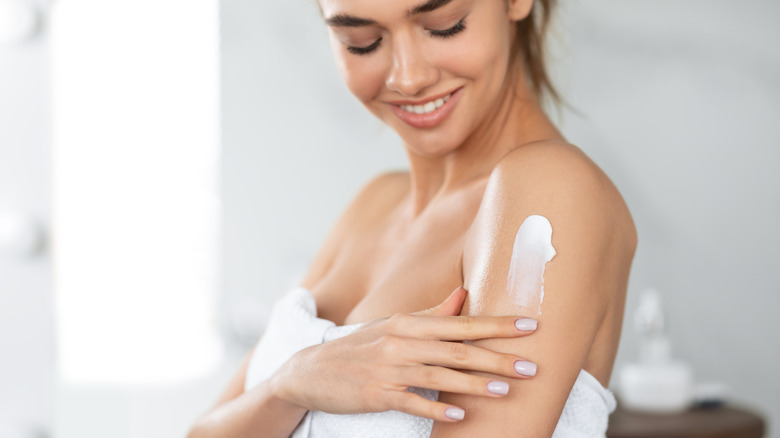Dehydrated Vs. Dry Skin: What's The Difference?
We all experience dry skin from time to time — or do we? Many people use the terms "dry" and "dehydrated" interchangeably and, while the two have many similarities, American Spa notes that they are not actually the same thing. What makes it more confusing is that they have similar symptoms, and sometimes you can experience both simultaneously. New York-based dermatologist Y. Claire Chang shared with Allure's "The Science of Beauty" podcast that people "with oily skin can still have dehydrated skin, which means it can have high sebum levels, but low water content."
It can be hard to tell the difference because your skin feels dry in both cases. Dry skin is a skin type, though, and comes down to genetics (via Verywell Health). This means your skin lacks oils, so even when you moisturize your skin, it soaks the lotion in faster, so you need to use it more regularly than those with oily skin. Dry skin stays pretty constant throughout the year.
Dehydrated skin is a skin condition resulting from the lack of moisture in your skin caused by your surroundings. The baffling issue about this is that when your skin is dehydrated, it makes more oil to make up for lost moisture, resulting in zits and dry patches simultaneously (via Glamour). If you have dehydrated skin, it comes and goes depending on the time of the year.
Learning the difference between dry and dehydrated skin can help you take better care of your skin and keep it healthy.
The difference between dry and dehydrated skin is their underlying cause
As London-based dermatologist Dr. Cristina Psomadakis told Women's Health, "in the beauty industry, dry skin refers to a skin type where there are insufficient lipids to lubricate the skin, whereas dehydrated skin usually refers to a temporary condition where the skin lacks water or hydration." She added that the term "xerosis" can mean both in medical textbooks, which can easily confuse people.
If your skin type is dry, it is ordinarily scaly, itchy, and can feel tight. People with skin conditions such as eczema generally have dry skin where the skin gets irritated more easily and won't look as plump. Fortunately, there are products you can use to help with dry skin. Skincare products with lipids, ceramides, and glycerin are known to help people who have a dry skin type (via Byrdie).
If your skin is dehydrated, it will look dull and feel flaky even if it is oily to touch. People with normal or oily skin will experience more dehydrated skin in the colder months than the rest of the year due to environmental factors. Investing in a humidifier if you live in a dry climate can help with dehydrated skin. Using face mists throughout the day and using a moisturizer regularly can also replenish lost moisture. Healthline also notes that dehydrated skin can benefit significantly by adding hyaluronic acid, honey, or aloe to your skincare routine.

